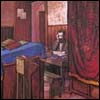Kollel (literally “collective” or “group”) most commonly refers to an institute of (advanced) Torah scholarship, particularly one whose students are married men.
Historically, it was used to refer to organizations that would raise funds in the Diaspora to support Jews in the Holy Land, many of whom were impoverished Torah scholars. The preeminent of these kollels is Colel Chabad, which was founded in 1788 by the first Chabad Rebbe, Rabbi Schneur Zalman of Liadi, and is the oldest continuously operating charity in Israel.
In time, it came to refer to any group of scholars who were supported by the community.
The modern-day kollel can vary from a one- or two-year program in which a young man immerses himself in intense Torah study to a life-long commitment to learning. Those who commit for the long run often opt for a life of austerity, valuing spiritual reward and satisfaction over financial security.
There are also part-time kollel programs—such as a kollel boker (“morning kollel”) or kollel erev (“evening kollel”)—or even retiree kollels, such as those in the Kollel Tiferes Zekeinim Levi Yitzchok network, which the Rebbe founded in tribute to his father, Rabbi Levi Yitzchak Schneerson.
Other Meanings
Since the word kollel means “collective” or “general,” it often has meaning completely unrelated to institutes of learning:
One classic example would be the term rav hakollel, referring to a chief rabbi, under whose unified leadership there may be several communities, each with their own rabbi.
Another example was the shaar hakollel, the “general gate” through which everyone was welcome to ascend the Temple Mount, regardless of clan or social status.







Start a Discussion